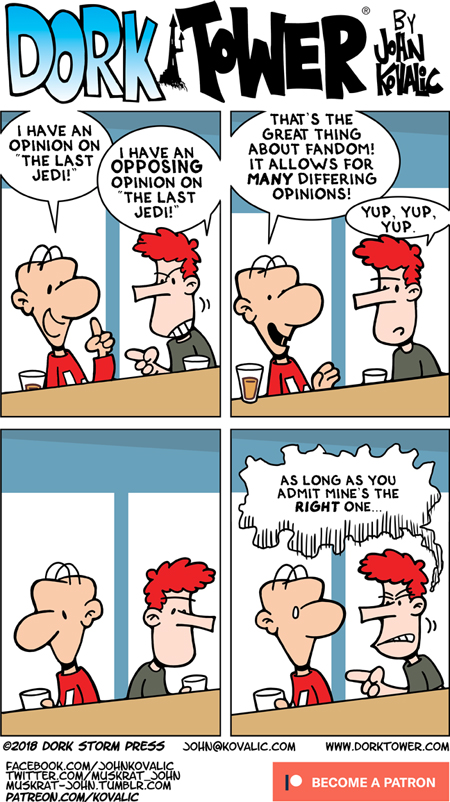I get what you're saying. It seemed odd to me, but it does raise the question: why are certain regional English accents (British, Californian) appropriate for Star Wars, but not others?
I don't recall a Californian accent, but a form of British has been the accent of the Empire since ANH. I don't know how British folks feel, but as an American I was willing to suspend my disbelief because it was pervasive without being over-done; because it was pervasive it blended into the background, and became part of the Star Wars milieu.
The "Texan" alien was momentary (isolated to one scene) and the voice acting was quite over-done.
But, admitted, they do less-than-admirable things from time to time. Like fall to the Dark Side and lop off their son's hand.
I never saw Vader as a Jedi. He was always a bad guy. I'd say he was actually a better character with how he fell from Jedi-hood being left a mystery, because the prequels did a poor job of depicting that fall.
It was especially egregious with Luke "giving up" because (a) that was part of his immature character he grew out of during the original trilogy, and (b) the radical change to his character – a character some of us already care about – is made off-camera.
"National Geographic" is a great way to describe those scenes, but I think it also explains why they're in the film. In TLJ the Force is depicted as the sum of forces of nature, all that energy and tension in a state of balance, the cycle of life and death, etc. So we get Rey, often seen as a small figure practicing lightsaber forms surrounding by the force and grandeur and natural beauty of that island. The cinematography serves those scenes well -- emphasizing the relationship between the Force and the Jedi.
I had no problem with the cinematography itself. It is beautiful, if cut together a bit too fast. I like "National Geographic."
However, it felt
entirely off-theme, it felt like something from
another movie inserted into a supposedly Star Wars movie. The result was jarring rather than – what I assume was intended – revelatory/inspiring. "National Geographic" felt too much like a hammer banging me over the head with the theme of balance/Tao. What would have worked instead? A quiet longer cut to Rey's face, maybe a hint of nature sounds emerging along with change in music, the expression on her face gradually changes. Star Wars has always been more subtle about Force mysticism, and that subtlety actually makes for more poignant scenes.
Compare them to Luke's training scenes on Dagobah. I think the idea is somewhat similar; Yoda is hiding out a swamp planet, in a place surrounded by life, by the Force. Except it's shot on an obvious soundstage, all (almost?) inert material. TLJ's swooping on-location nature porn does a better job.
Well, comparing them, Luke's training scenes on Dagobah had Yoda providing far more interesting teaching moments. Whereas Rey's were far less teaching and more communing telepathically with Kylo Ren.
In Empire Strikes Back, Yoda didn't seem to be in hiding, but rather meditating on the Force. A stark contrast to Luke having severed himself from the Force. Yoda exudes wisdom. Luke displays bitterness and regret. Very different.
And I'll agree to disagree with you on which training montage was more effective. The "nature porn" (as you call it, I prefer "National Geographic" sequence) of TLJ seemed like a blunt narrative instrument compared to the sequences with Yoda in ESB.
Aside from all the stuff that didn't work for you, what seemed "nihilistic and cynical" about it? It's clearly -- i.e. stated directly in-movie by a character message is "Choose to fight when you must. Don't fight to destroy your enemies. Fight to save the ones you love".
Even Luke's arc is uplifting. After years of self-imposed exile spent in despair and self-doubt -- though to his credit never falling to the Dark Side -- he gives Rey a masterclass lesson in the Force, then goes out in a franchise-best Crowning Moment of Awesome to aid his sister and her Resistance. Then, finally at peace, he evaporates into the Force, having not actually broken his vow to never leave Ahch-To.
Mind you, I'm not trying to argue you into liking the film. But where's the nihilism?
No worries, I get that The Last Jedi was polarizing.
"Choose to fight when you must. Don't fight to destroy your enemies. Fight to save the ones you love". That was a line in the movie, yes, but rest of the movie didn't really support that.
Luke's cynicism for one – raising his lightsaber with the thought of striking a sleeping studen? tossing the lightsaber? saying "it's time for the Jedi to end"? WHOA. And Rey trying to save Kylo only for him to double down on the Dark Side? Kylo explicitly saying "kill the past"? Codebreaker's line about "good guys, bad guys, it's all the same when you look at who makes the weapons"? Poe being misguided, rebelling against purple-hair lady, and ultimately getting stun-blasted by Leia?
All of that left me with the feeling that the movie had no real message, that it rejected the moral principles of the Jedi entirely. It was special effects, some scarce bits of pithy dialogue, jokes a plenty, cameos, obligatory chase/lightsaber scenes, but no real substance.



